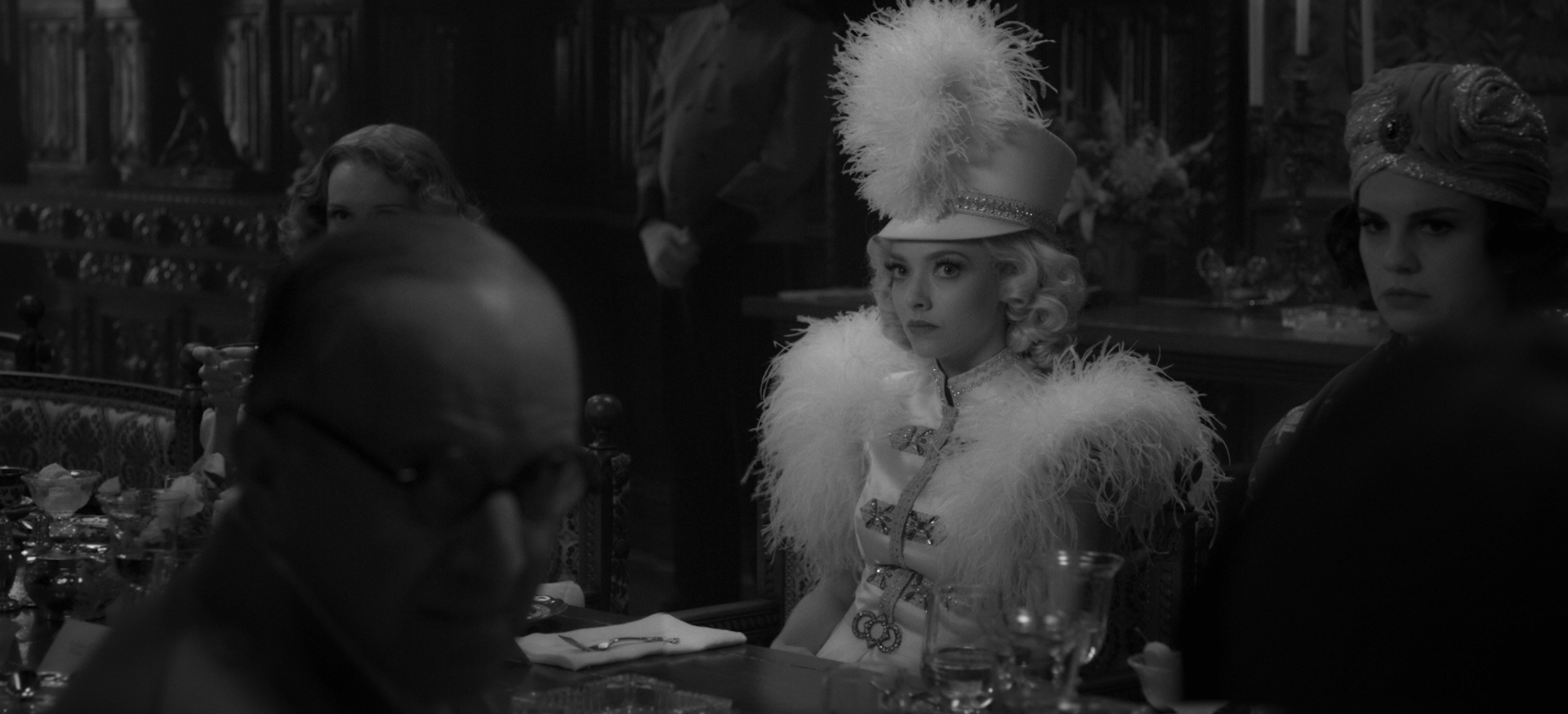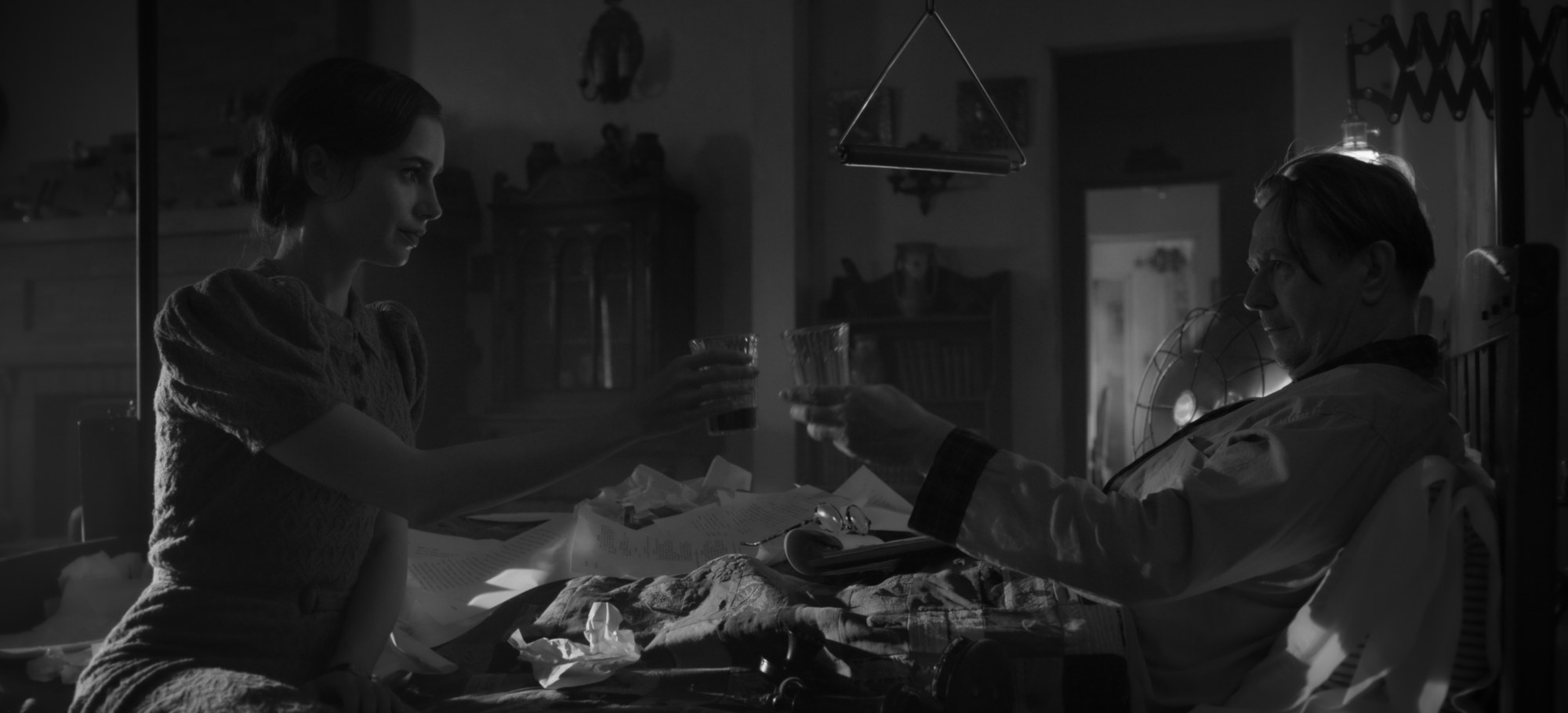Films about old Hollywood are famously hypermasculine. They reflect an era of moviemaking in which women were rarely more than wide-eyed starlets. When boards of directors were commissioning films about men who looked and lived just like them. But beneath the surface existed the hard and often unsung work of women.
Mank, the latest film from Mindhunter and Fight Club director David Fincher starring Lily Collins and Amanda Seyfried is a masterful film about old Hollywood as it really happened.
The story of real life, down-and-out screenwriter Herman J. Mankiewicz (“Mank”), the film captures the boozy final stretch of his time writing the script for what’s now widely regarded as the greatest movie of all time: Citizen Kane. Inspired by his volatile friendship with newspaper giant William Randolph Hearst, it’s a movie the writer is rarely given the credit for, despite doing most of the groundwork on the script that cemented the positioning of its director, Orson Welles, as a legend of cinema.
Mank is a funny, well-formed film about the art of the underdog; friendships inspiring creativity, and the legacies we leave behind. The script — written by David’s late father, Jack — was long considered too niche to get financed. This week, it will hit Netflix.
But at the movie’s beating heart is his relationship with two women that play a key part in his success — though their presence was seldom given nearly as much credit in reality. Marion Davies, played by Amanda Seyfried, was an actor and the mistress of Hearst who, in the film, spends plenty of time acting as a wise soundboard for Mank’s thoughts and ideas. She’s reactive and smart; Amanda’s getting Oscar buzz for her performance already.
Then there’s Rita Alexander, an English secretary who scribes for Mank as he lies bed-bound following an accident, capturing Citizen Kane’s creation in real time. Played by Lily Collins, her character is a world away from Emily in Paris. In the early stages of filming, Lily spent time flying from France to Los Angeles at weekends, jumping between the two characters.
Here, in conversation with i-D, Amanda and Lily unpack the appeal of their characters, research under a famously strict director, and what they’d like their legacy to be.
I wanted to start by asking about this film’s hugely masculine, boorish energy, and the fact that, despite that, so much of the success Mankiewicz experienced can be traced back to the conversations he had with the women around him. In some ways, they’re the bedrock of his success. How did these characters appeal to you within the context of old Hollywood’s patriarchy?
Lily: For me, it was interesting to play a character from England being brought to America, because there was a cultural difference between women of the time there and [here]. I did research on both to merge that into one character. I think it would be easier to be [one of Mank’s] team members. Rita was hired, and therefore, one would assume that they wouldn’t vocalise their personal opinions or have an emotional connection with their boss. Rita believes so strongly and passionately in Mank and his potential, and holds a metaphorical mirror up to him. She’s not afraid to express how she feels with him. That was something that appealed to me: how she vocalises herself, and she can be quite risky, considering the time period. She felt like a rare bird. She got to show that backbone.
Amanda: Marion was a lot smarter than people gave her credit for. How do you manage to negotiate through that world? Especially with Hearst, having all of these men surrounding her. He had his hands in everything and she was privy to it all. She felt safe to them. She related to all of these men and didn’t feel like she had to hide herself. I realised she was rare.
There’s a famous strictness to the way David Fincher makes films, and both of your characters are based on real people. Can you do research on a Fincher movie and, if you did, did you uncover anything you didn’t know about your characters beforehand?
A: There were some movies I was able to watch, and an autobiography that’s based on interviews she did 10 years before she died, so it was all ‘memory lane’ for her. I had a lot of information but I never felt like I had a straightforward perspective on what she was like behind the scenes. The script gave that to me. It was all there! Besides, it was hard to find anything. I took pieces of everything: the way she carried herself in movies, and her accent — Dave and I spoke about her having a slight Brooklyn accent. There were pieces of everything that I tapped into and added to the character on the page.
L: There’s very little research to be done on Rita. We only found two photographs and a small blurb, so it was a mixture between what I could read and what Gary [Oldman, who plays Mank] and I created in those moments together. Researching women of the time in England and America helped, as well as women in her position. There’s so much going on in those rooms with Mank that informed the character, as opposed to not having anything to go by. And for me, hair, makeup and wardrobe played such a huge part in the creation of the character. Rita is so different from Marion. She’s way more reserved in the way she looks and her demeanour. I loved having that juxtaposition with Amanda and I. I got to play the total opposite!
A: I think Marion, Mank and Rita would have really hung well though! There’s a similarity in the way we’re all brutally honest. They would have been great in a room together.
L: I agree!

Had either of you spoken to someone who’d worked with David before you signed on?
A: I hadn’t, had you?
L: I don’t think I had. I know people who know him but I hadn’t talked to another actor [about him]. I’m kind of glad that I didn’t. I like to experience things fresh. Every story and job is so different, and everyone’s in different phases of their life when you meet them. I didn’t want to taint anything. I was already so confused as to why I was being given this opportunity! I thought, I’m not going to question it, I’m going to embrace it for what it is.
A: It’s rare you get to come into something on a level playing field with everyone else. I knew Gary, cause I’d worked with him, but I didn’t go looking for information about David. A level playing field makes it so much easier. All I knew is he did a lot of takes, and it’s true! Watch his movies and you’ll know why! There’s a method to the madness and I respect that more than anything.
Lily, you said you were confused as to why you’d been asked to join the project. How do you navigate those changes between projects as actors?
L: I did a tape two days before I went to Paris to shoot Emily in Paris and I thought it was just going to go into a void. I didn’t know if David would see it or how it would play out. Then I found out he’d responded to it and that he wanted to Zoom with me. At that point I didn’t even know what Zoom was! So we Zoomed from Paris at the end of a long shooting day. I didn’t know how it went and I remember calling my fiance and being like, ‘I think it went well, but I don’t know! I’ll never get it. It’s David’. I’d never assume I’d move forward with it.
And then a couple weeks went by and I found out I got it. It was a mix of excitement and joy but also deep confusion. I was in Paris and we hadn’t met in person. I was shooting this comedy in France and there was this amazing, black-and-white movie with David Fincher [on the cards] — there was no way. I’m character and material driven. I don’t have to do one thing after the other. It’s purely: ‘What excites me? What director do I want to be lead by?’. This ticked every box. I would have played a background character. So I flew back-and-forth from Paris [to Los Angeles to shoot it] twice. I was in the air longer than I was on the ground.
A: This project came out of left field for me too. It was like ‘What? David Fincher is doing another movie?! It’s about what?!’

Which one of your projects deserves the Mank treatment; a film about the making of it?
A: There’s always a story behind every movie! Don’t you ever just wish there were cameras following you around as you were making movies? It’s so funny and chaotic. I feel like there should be a movie about the making of Mamma Mia, because it was hilarious! There’s no intrigue there, it was just bonkers.
L: But so fun though, right? I feel like I’ve heard from people on the set with you! When you get a group on a set together and everyone gels, you feel as though when the cameras are rolling it’s just an extension of when the cameras are off. How magical!
This film is in many ways about legacy: the legacy our work leaves and the legacy our parents leave as Jack, David’s father, wrote this script. How often do you think about legacy and how your work will live on?
A: I try not to think about death, because that’s what legacy equals to me. I just want to be known for helping people get lost a little bit.
L: Growing up in a family where my dad is a musician who’s well known for what he does, I had that feeling growing up about whether I’m following his legacy or creating my own. For me now… it’s less about creating a legacy and more about wondering if I’ll have learned about myself, or grown as a human; or be in a place where I’ve been able to live my life and have a career. I’ve been able to work with incredible women since day one who’ve done just that. Like, Amanda, you’re an incredible mother and you have your job. Everything can happen at once, and if you put things in perspective, then the right jobs will come. And you’ll be able to look back and be proud of what you created, and who you’ve become. That’s what I want legacy to be for me. That I’ll be proud of who I’ve become at the end of the day.
‘Mank’ will launch globally on Netflix from 4 December


